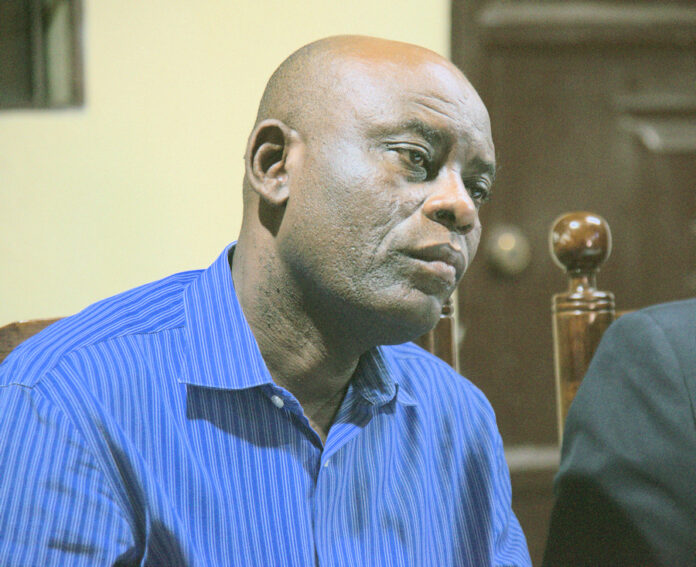
Documents obtained by The Canada Files show that a controversial Haitian human rights group, the National Human Rights Defense Network (RNDDH), receives Canadian government funding through a non-profit legal advocacy organization.
Avocats sans Frontières Canada (ASFC) got the funding for a program in Haiti named “Access to Judicial Services” for more than $19 million CAD, through Global Affairs Canada. ASFC has long had a partnership with the RNDDH, being one of 25 organizational partners for Haiti programs. Under the “Access to Judicial Services” program, one of three ASFC projects, “Access to Justice and Fight Against Impunity in Haiti,” is where the undisclosed amount money was given to the RNDDH. Global Affairs Canada confirmed it is aware that the RNDDH got funding from ASFC’s project, when reached out to for comment.
Providing funding for the RNDDH for “advocacy activities” should sounds an alarm for those familiar with the RNDDH’s history and the Canadian government’s role in the 2004 coup d’etat against Haiti’s democratically elected President Jean-Bertrand Aristide.
In a written response, ASFC says it “provides financial support to RNDDH, enabling them to continue their work documenting serious human rights violations and the way the justice system is processing such cases in accordance with the rule of law.” ASFC would not disclose the amount of funding given to the RNDDH, citing confidentiality.
ASFC also explained that this funding allows RNDDH to “to provide legal support to survivors of gender-based violence and to pursue their advocacy activities.” The RNDDH’s “advocacy activities” are truly infamous, and coincide with events just after the 2004 coup against Aristide, which Canada played a key role in.
Canada’s role in 2004 coup against Aristide
Then-Haitian President Jean-Bertrand Aristide had won the 2000 election with almost 92% of the popular vote. The election was a resounding victory for Aristide and Fanmi Lavalas (FL), which won local elections across Haiti and 16 out of 17 senate seats.
On Feb. 29, 2004, a coup d’état backed by the U.S., Canadian, and French governments forced Aristide from office, with Canada playing a key role in organizing it.

The first meeting, referred to as the “Ottawa Initiative on Haiti,” was held at the federal government’s conference center on Meech Lake near Canada’s capital, on Jan. 31 and Feb. 1, 2003. This secretive meeting laid the groundwork for a military intervention that would occur a year later by U.S. and Canadian forces against Aristide.
Canada provided 50 soldiers to secure Haiti’s Toussaint Louverture International Airport. Aristide was abducted by a U.S. SEAL team and flown out of this “secured” airport to be left in the Central African Republic.
The coup had a devastating effect on Haitian society.
A 2006 Lancet study revealed that “during the 22-month period of the U.S.-backed Interim Government, 8,000 people were murdered in the greater Port-au Prince area alone. 35,000 women and girls were raped or sexually assaulted, more than half of the victims were children.”
Mario Joseph, director of the Bureau des Avocats Internationaux (BAI) argues that “if the Lancet cited 8,000 murders in Port-au-Prince between 2004 and 2006, we have to double this number to reflect what happened throughout the country.”
The Canadian-funded NCHR-Haiti played a key role in the coup
Pierre Espérance and the RNDDH played a key role in the coup d’état that forced democratically elected Aristide from power in 2004.
At the time, Espérance’s so-called human rights group was named NCHR-Haiti.
Brian Concannon, a human rights lawyer and director of the Institute for Justice and Democracy in Haiti (IJDH), described NCHR-Haiti as a “ferocious critic” of Aristide’s government and an “ally” of the illegal regime. According to Concannon, the Latortue regime “had an agreement with NCHR-Haiti to prosecute anyone the organization denounced.”
“People perceived to support Haiti’s constitutional government or Fanmi Lavalas, the political party of President Jean-Bertrand Aristide, [were] systematically persecuted from late February [2004] through the present. In many cases, the de facto government of Prime Minister Gérard Latortue is directly responsible for the persecution,” Concannon explained.
NCHR-Haiti “became increasingly politicized and, in the wake of the 2004 coup d’état, it cooperated with the IGH [the Latortue / Boniface regime] in persecuting Lavalas activists,” Concannon later wrote in The Jurist. “The persecution became so flagrant that NCHR-Haiti’s former parent organization, New York-based NCHR, publicly repudiated the Haitian group and asked it to change its name.”
Espérance and NCHR-Haiti then changed their name to the “National Human Rights Defense Network”, or the RNDDH.
The RNDDH manufactured a “massacre” to frame Haiti’s PM Yvon Neptune
In an open letter sent on Oct. 19, 2006, to Haiti’s Justice Minister René Magloire, human rights lawyer Joseph refers to NCHR-Haiti as an “injustice machine” that was invented through Canadian government funding. Joseph argued that accusations made against FL elected representative Amanus Mayette and former prime minister Yvon Neptune “are political”. Emphasizing that accusations by NCHR-Haiti resulted in “more than a hundred Fanmi Lavalas grassroots activists” being “arrested and detained with no charge, and no trial.”
Joseph and several other human rights lawyers demanded the release of FL political prisoners, including former parliamentarian Mayette and Neptune.
The letter also highlights NCHR-Haiti’s role in the Latortue regime’s “tenacious program of vengeance” which caused “caused considerable harm to the political prisoners,” noting that “it was on the basis of a mere [NCHR-Haiti] press release” that Neptune and Mayette were arrested.
In a separate interview, BAI’s Joseph accused the RNDDH of fabricating allegations against three elected FL leaders as part of a “disinformation campaign.” Joseph represented these leaders as a defense lawyer against allegations that they orchestrated a massacre in La Scierie, a neighborhood of Saint Marc in Haiti.
Author Jeb Sprague described the events in La Scierie in his book Paramilitarism and the Assault on Democracy in Haiti, which would be used by Espérance and RNDDH to help create the grounds for his illegal detention by the coup regime.
Sprague describes a coordinated attack where anti-government paramilitary forces attacked police stations across the Haiti’s Gonaïves region in early 2004. After the city’s fall, a smaller group broke away and entered Saint-Marc (La Scierie). This paramilitary squad met up with RAMICOS (Rassemblements des Militants Consequents de la Commune de Saint-Marc). Sprague describes RAMICOS as a “quasi-paramilitary group financed by opposition elites.” RAMICOS and the paramilitaries immediately attacked government buildings and police stations.
A week later, government forces pushed back the paramilitaries and retook Saint-Marc. During this operation, government forces were supported by a local armed defense group named Bale Wouze. Afterwards, RAMICOS forces remained in Saint-Marc.
Following the victory against the paramilitary forces, Prime Minister Yvon Neptune visited Saint-Marc, inspecting the remains of a burned down police station attacked by RAMICOS and other paramilitary forces.
A day after the retaking of Saint-Marc, RAMICOS forces attacked a police station in the La Scierie neighborhood. A mix of police officers, Bale Wouze members, and citizens of La Scierie defended their neighborhood and successfully pushed back RAMICOS forces. In this firefight, several people were killed, including civilians.
Sprague clearly doesn’t consider the RNDDH to be a credible human rights group, describing it as an “opposition-aligned human rights group”.
Following the La Scierie events, the RNDDH described the battle as an “Aristide government-sanctioned massacre.” The RNDDH had the audacity to demand “immunity for paramilitary financier Judy C. Roy” while blaming Neptune for orchestrating a “genocide” against civilians.
Neptune was jailed and illegally detained. The RNDDH’s accusations against Neptune were a direct cause of his prolonged, illegal detention.
Subsequent investigations by independent investigators and the United-Nations undermined Espérance’s description of events in La Scierie.
A Press for Conversion! article by Kevin Skerritt explained that, following an April 2005 investigation into the violence in Saint Marc, the then-UN Human Rights Expert on Haiti, Louis Joinet, “dismissed accounts of a massacre” and described instead a series of killings in “confrontations” between two armed groups with casualties on both sides.
Joinet’s conclusions were echoed by Thierry Fagart, chief of the UN Mission’s Human Rights division, who also said “since the beginning of the procedure until today, the fundamental rights, according to national and international standards, have not been respected in the case of Mr. Neptune.” Fagart continued, “for me, it is clear that they have never had any legal grounds to prosecute him. From the very beginning until today, all the proceedings against him were illegal.”
Fagart concluded that Haiti’s democratically elected government’s decision to take back Saint-Marc by force was justified. “I think that they were right because they were – I’m not a supporter of Lavalas, I want to make clear that I am not a supporter of Lavalas. But at the same time, it was clear that the legal government was the Aristide government.”
In 2006, Canadian investigative journalist Chris Scott visited Saint Marc. He dismissed NCHR-Haiti as a “partisan” group whose allegations against Neptune were nothing more than “conjecture.” He concludes that “given Canada’s unacknowledged role in the overthrow of the Aristide government and its enthusiastic support for the post-coup régime,” Canada’s decision to fund NCHR-Haiti shows “complicity” in the “very partisan game.”
Indeed, within weeks of the allegations launched by NCHR-Haiti against Neptune, the Canadian Embassy in Haiti announced that $100,000 CAD in funding would be allocated to the organization. An investigation by journalist Anthony Fenton revealed NCHR-Haiti applied for over $79,000 CAD for “legal representation for the victims of La Scierie.”
ASFC pretends RNDDH had no role in Neptune’s illegal detention
ASFC published a document titled “Haïti: Guide pratique sur le recours en habeas corpus” (Haiti: A practical guide to recourse in habeas corpus) on their website. The guide was created under the AJULIH project with funding from the Canadian government. The guide is designed to assist Haitian human rights lawyers defend Haitians who are illegally detained.
The only case the document provides as an example of a Haitian whose rights to habeas corpus (in short, the fundamental right in the Constitution that protects against unlawful and indefinite imprisonment) is then-Prime Minister, Yvon Neptune.
The document refers to Neptune’s case without mentioning that his illegal imprisonment was a result of false allegations by Espérance and NCHR-Haiti.
The ASFC document focuses on the Inter-American Court of Human Rights (IACHR) ruling that the State of Haiti violated Neptune’s human rights.
The IJDH’s summary of the ruling explains that the IACHR found the Haitian State violated “11 different provisions of the American Convention on Human Rights by illegally imprisoning former Prime Minister Yvon Neptune for two years and allowing the case to drag on in the courts for almost two more.”
“The Court criticized nearly every aspect of Haiti’s prosecution of Mr. Neptune,” the summary explained. “It found Mr. Neptune’s 25-month-long detention illegal, and the prison conditions he endured to be inhumane and degrading.”
When asked about their partner organization’s role in Neptune’s persecution, the ASFC avoided commenting, stating that the “Neptune decision by the Inter-American Court of Human Rights was used in the guide, as it is a decision handed down by a regional instance on abusive pre-trial detention.”
When Solidarity Groups Investigated RNDDH and Espérance
Several delegations from Haiti legal advocacy and solidarity groups visited Haiti after the 2004 coup to investigate alleged human rights violations there. Their reports concur with the accusations made by the IJDH and BAI regarding Espérance and NCHR-Haiti’s collaboration with the coup government to persecute FL leaders and supporters.
The Quixote Center sent a delegation to Haiti led by retired Caribbean Studies professor Tom Reeves. Upon returning from Haiti, Reeves wrote an article explaining the delegation’s findings in which he described NCHR-Haiti as “completely partisan: anti-Lavalas, anti-Aristide. This is simply not proper for a group calling itself a ‘Haitian Rights’ organization.”
In April 2004, the National Lawyers Guild sent their second delegation to Haiti. One of the report’s eight “Unanimous Statements and Recommendations,” was an unequivocal condemnation of the group: “We condemn the National Coalition for Haitian Rights (NCHR) in Haiti for not maintaining its impartiality as a human rights organization.”
The Haiti Accompaniment Project (HAP) visited Haiti in June 2004. The HAP delegates were also part of the Haiti Action Committee, based in California.
The HAP report notes that in 2004, the NCHR-Haiti “helped develop support for the coup with exaggerated reports of human rights violations by supporters of the elected government. At the same time, they downplayed or denied the much more massive violations of the de facto regime and its paramilitary allies.”
The report also explains how NCHR-Haiti denounced supporters of Aristide’s government. According to HAP, NCHR-Haiti offered no evidence for the accusations it leveled against FL supporters, resulting in “illegal arrest, incarceration and sometimes the disappearance of the accused.”
The HAP delegation met with a grassroots victims rights group who shared that they were “dismayed that the outside world still looked upon NCHR as a credible independent voice.” They told the delegates that “NCHR was now working hand-in-hand with the post-coup Minister of Justice in carrying out illegal arrests and detentions.”
The HAP delegation concluded bluntly that “they are not [an] independent human rights group.”
Canadian NGOs and Unions parroted Canadian government-funded RNDDH propaganda
Despite efforts from Haiti solidarity and legal advocacy groups, the Canadian and U.S.-funded propaganda campaign to frame Aristide’s popular, democratically elected government as tyrannical, was successful.
Several Canadian NGOs, unions, and civil society organizations became staunchly anti-Lavalas as a result of this propaganda.
In a 2005 article, Yves Engler points out that “several Quebec unions that received hundreds of thousands of CIDA dollars for work in Haiti through the Centre International de Solidarité Ouvrière (CISO) passed resolutions condemning Aristide’s alleged anti-union activities.” Engler explained that the FTQ and CSQ union federations and a half dozen NGOs, part of an informal group known as the Concertation Pour Haiti (CPH) “branded Aristide a ‘tyrant’ and his government a ‘dictatorship’ prior to the 2004 coup.”
The Canadian government also funded anti-Lavalas media outlets like Alterpresse, which repeated NCHR-Haiti/RNDDH propaganda repeatedly.
In his report on La Scierie, Skeritt explained that during the months leading up to the 2004 coup, the Quebec-based L’Association Quebecoise des Organismes de Cooperation Internationale (AQOCI), a network of 53 international aid groups, “became so swept up in the anti-Aristide and anti-government hysteria generated by groups such as NCHR-Haiti” that they issued a press release urging the Canadian government to withdraw all support from the “Lavalas party regime” and to denounce the Aristide government for its alleged human rights abuses.
Skeritt’s report argued that Rights and Democracy (R&D), a federally-funded organization, “uncritically accepted NCHR-Haiti’s allegations”.
In a 2014 article, Yves Engler explained that “in October 2005 R&D began a $415,000 CIDA-financed project to ‘foster greater civil society participation in Haiti’s national political process.’”
The coordinator of the project, and future director of R&D’s Haiti office, was Danielle Magloire. Magloire was a member of the “Council of the Wise” along with six other individuals from Haiti’s elite, including Dr. Ariel Henry, Haiti’s just deposed de facto Prime Minister backed by Washington and Canada.
Henry was selected to lead Haiti by the U.S. government and the CORE group via a tweet containing a short statement of support. The CORE group is made up of representatives of the United Nations, Brazil, Canada, France, Germany, Spain, the European Union, the United States, and the Organization of American States (OAS).
The Council of the Wise appointed Gérard Latortue as de facto prime minister after the coup ousted Aristide.
According to Engler, “in mid-July, 2005, Magloire issued a statement on behalf of the ‘Council of Wise People’ saying any media that gives voice to ‘bandits’ (code for Lavalas supporters) should be shut down. She also asserted that Lavalas should be banned from upcoming elections.”
Magloire’s rise to prominence is due to funding from the Canadian government. In their book Canada in Haiti, authors Yves Engler and Anthony Fenton pointed out that Magloire’s ascension to the Council of the Wise “came largely from her positions at ENFOFANM and CONAP”. The authors argue that these “CIDA-funded feminist organizations would not have grown to prominence without international funding.”
More recently, Magloire is credited as an editor of a Mar. 2, 2018 ASFC publication titled “Mémoire portant sur la lutte contre l’impunité en Haiti” (Memoire of the Struggle Against Impunity in Haiti) as part of the AJULIH project.
Magloire is also a vice-chair of FOKAL’s Board of Directors, another ASFC partner in Haiti.
FOKAL was founded by George Soros and the Open Society Foundation. According to Kim Ives, FOKAL “played a small but visible role in late 2003 and early 2004” by characterizing the Aristide’s elected government as “hostile” to human rights. At the time, FOKAL was receiving $4 million USD each year, from the Open Society Foundation.
Further corruption accusations against Espérance
It is clear Espérance’s RNDDH is willing to take funding from foreign governments in order to persecute political rivals in Haiti. For the 2004 coup, the target was the Fanmi Lavalas and Aristide – then wildly popular among Haitians generally and opposed to the neoliberal policies Washington and Canada wanted to impose on Haiti.
As veteran Haitian activist and writer André Charlier argued, the “RNDDH is a political organization hiding behind the facade of a human rights organization.” A facade that is maintained through funding from the NED, the Open Society Foundation, and the Canadian government.
During 2009-10, Washington began shifting its support away from the sector of the bourgeoisie and economic elite which had facilitated the 2004 coup d’état in favor of neo-Duvalierists who had recently coalesced under the banner of the “Haitian Tèt Kale Party” political party – the PHTK, led by Michel Martelly.
Martelly immediately targeted human rights groups in Haiti. Intolerant of criticism, the PHTK did not discriminate between western backed outlets like the RNDDH or legitimate human rights and legal advocacy organizations like the BAI. Human rights advocates critical of the government began receiving death threats, harassment, and intimidation, including threats of arrest by ministerial order.
This caused a realignment of the human rights sector in Haiti, to be explored in a future article. In short, they had all become opponents of the PHTK government.
Despite being targeted by the U.S.-backed regime and finding support among former opponents in the human rights sector, Espérance continued to use the RNDDH as a platform for persecuting political opponents.
After spending almost 10 years in illegal detention in a jail cell, mostly in the National Penitentiary, Sherlson Sanon spoke to the media on Feb. 2, 2023, describing how Espérance and the RNDDH manipulated him to frame political opponents.

When Sanon was first arrested in 2013, he was active in Moise Jean-Charles’ party Platfòm Pitit Desali
n. Sanon was arrested for handing out leaflets for the party in a neighborhood where Senator Joseph Lambert had won the previous election.
Pierre Espérance later told Sanon that he had rescued him from his illegal detention.
Sanon alleges that Espérance offered him legal representation and a ticket out of Haiti. Sanon was handed a series of documents to sign. Believing they were travel documents intended to help him flee persecution, he signed without reading them. Unbeknownst to Sanon, he was actually signing a fabricated confession written by the RNDDH.
This false confession included allegations that implicated two of his political enemies – Senators Joseph Lambert and Edwin Zenny – of collaborating with a local gang. Both Lambert and Zenny were allies of Martelly.
Sanon was then put into “protective custody” – an illegal detention in the National Penitentiary – for almost 10 years. According to Sanon, he was only allowed to contact the RNDDH and the American Embassy for the first three years of his imprisonment.
Sanon was never tried for any crime.
The RNDDH published Sanon’s false confession on Mar. 12, 2013. This RNDDH report “revealed” that Sanon had been hired in 1999 by Lambert to become a member of a powerful gang called “Base Kakos.” According to the RNDDH report, “this gang allegedly operated in the South-East under the leadership of former senators Joseph Lambert, Edo Zenny, the then government commissioner of Croix-des-Bouquets Leny Thelisma, and brothers Joël and Jacky Khawly, who specializing in drug trafficking, kidnapping for ransom, and assassination.”
In an interview with Radio Kiskeya, Zenny denounced the RNDDH and other adversaries of “political machinations.” Lambert, seemingly aware of the false confession, told the media “they [RNDDH] wrote the text and had him sign it.”
Accusations of corruption against Espérance and the RNDDH also come from ex-staffers.
Marie Yolène Gilles left the RNDDH in 2017. In her resignation letter, Gilles argued that her credibility would be “tarnished” if she remained in the position of RNDDH’s program director because Espérance had violated the organization’s rule against taking money from the State.
She accused Espérance of taking 1.5 million Gourdes (Haiti’s currency) from the government’s Bureau de Monétisation des Programmes d’Aide au Développement (BMPAD). When Espérance was confronted with the accusation, Espérance initially denied receiving the funds. Gilles claims Espérance also lied to other RNDDH members about taking the funds. Then a photo of the cheque began circulating on social media, forcing Espérance to admit he took the money.
At the time of Gilles’ departure, RNDDH’s new program director Vilès Alizar told the press that the incident was an opportunity to “reaffirm our vision” as an organization and promised a “detailed report” on how the various funds had been used.
Sixteen months later in August 2018, Alizar left the RNDDH. He denounced the “bad practices” of “leaders of the organization,” saying that despite attempts to reform the RNDDH, he “realize[d] that these provisions have proved insufficient because of resistance“ from leadership, who have “refused to undertake reforms.”
The agreement between ASFC and Global Affairs Canada was officially signed on Mar. 28 and 29, 2017 – less than one week before Gilles left the RNDDH. This funding agreement began the The “Access to Judicial Services” program and a six-year collaboration with 25 partner organizations in Haiti.
The RNDDH has continued to function as a political organization from 2017 to today. Espérance’s aversion to popular movements persists as he continues to use the RNDDH as a platform for political influence. Fanmi Lavalas supporters told the HAP delegation in 2004 that they were “dismayed that the outside world still looked upon NCHR [-Haiti] as a credible independent voice.” The evidence shows that observers should be equally dismayed that the RNDDH continues to be looked upon as a credible, independent voice for human rights.
In a written response, Global Affairs Canada confirmed they knew funding was being provided to the RNDDH through ASFC’s AJULIH project, The Canadian government continues to support Pierre Espérance’s platform for political machinations.
ATIP Documents
A-2023-01616
An earlier version of this article was first published by The Canada Files, that country’s only news outlet focused on Canadian foreign policy. Travis Ross is a teacher based in Montreal, Québec. He is also the co-editor of the Canada-Haiti Information Project at canada-haiti.ca. Travis has written for Haiti Liberté, Black Agenda Report, The Canada Files, TruthOut, and rabble.ca. He can be reached on Twitter.











[…] qui prétendent agir dans l’intérêt du « peuple », mais il a été démontré qu’eux aussi ne sont généralement que des pions dans ce jeu beaucoup plus vaste de contrôle et de […]